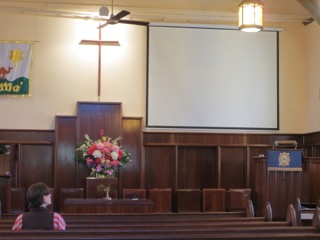
‘So much of the church,’ said Desiree, ‘is about marriage.’
Desiree was giving a talk on singledom at C3 Ballina*, and I love that the first thing she does is acknowledge how much of church life is focused on and revolves around couples. (Disclaimer: Desiree also references my book, Surviving Singledom, so I am somewhat biased in sharing her talk!)
She follows this up with, ‘It’s OK to be single!’ It sounds simple, but many people in the church—especially those in the Smug Marrieds camp—view singledom as a problem. Single people, they think, are lonely and unhappy and they need to fix that by matchmaking them immediately.
But singledom is normal. It is healthy. It is common. And it is not a sin.
‘It’s OK to be single!’
Whether single people are unhappy or not is up to them to decide. Many single people are happily solo. Many are frustrated in singledom. And many waver somewhere in between, sometimes content with their single state, sometimes less so. But it’s their business, not for anyone else to decide for them. Or ask. (If single people want to talk about their private lives, they will let you know.)
Why does the church, and society at large, weigh in when it comes to the private lives of singles? Is it because we’re insensitive and nosy? Is it because we idolise marriage and romance? Is it because we genuinely believe God prefers for people to be married?
It’s probably a little of all of the above. I’ve had unwelcome personal questions in church from near-strangers (‘How’s your love life?’ they ask me. ‘Do I know you?’ I respond.) I’ve seen the idolisation of marriage in the church too, Christian friends talking about ‘when’ I get married rather than ‘if’, as though it were an inevitable and ultimate part of life.
I’ve also heard preachers speak about marriage as though it were the most preferred, most desirable, most spiritual kind of relationship possible. It may not be explicit; perhaps they use lots of marriage examples in their sermons on suffering, but never discuss the hardships of being single or of friendships or relationships with families of origin. Or perhaps they wax lyrical about the beauty and benefits of marriage, sending a pretty clear message about how they value it over singledom.
I’ve heard preachers speak about marriage as though it were the most spiritual kind of relationship possible.
Of course, none of this is biblical. Marriage is no more holy or godly than any other life circumstance. Otherwise, what kind of life would be left for those who never marry, or those who separate or divorce, or those who lose a spouse to death? No one should be looked down upon because of singledom. Ever.
‘I am not a lesser person because I am single,’ says Desiree, of her past single state. She was in bible college at the time, struggling to find a husband, wondering why it was so. She made a decision: find her identity in being a child of God, not in being a wife or married person. It’s a simple yet profound truth, and perhaps some of us can use the reminder today.
I hope the Church can make space for those who are not married and who may never marry. How good is your church at welcoming singles, inviting them for dinner, making them truly part of the family? I hope your church is inclusive of singles, and if they are not, I hope they get better at it.
I hope the Church can make space for those not married and who may never marry.
Our common ground lies not in relationship status, but in belonging to God. We are children of God, friends of Jesus, welcome in the Beloved. Period.
Do you feel like you fit in to your church, whether you are single or not? Why do you think churches often struggle with responding to singles? How can your church get better at including singles in church life? Share your story. Let’s have a countercultural conversation.
*You can listen to Desiree’s full talk here (talk starts at 14:00): https://youtu.be/X8x47ey8_hg?t=835